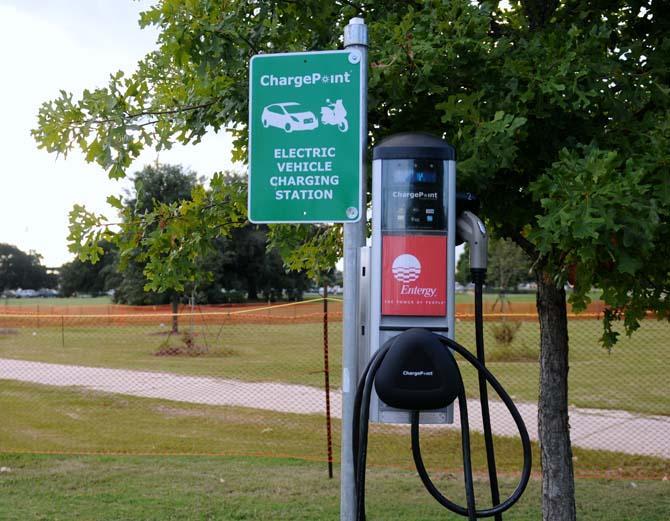Environmentalists and engineers alike have worked tirelessly to encourage the widespread use of electric vehicles, and finally, the technology to make it happen has arrived in full force in the Baton Rouge community and at the University.
The main focus now is how to integrate this new electric vehicle culture into consumers’ everyday lives.
That was Entergy’s goal when it began donating electric vehicle charging stations to universities across the state, including two at LSU, in 2011.
Although the University has seen a handful of EV owners utilize the charging resources located on campus, organizations like Louisiana Clean Fuels — a non-profit organization that works as a designated chapter for the national Clean Cities Coalition — as well as companies like Entergy and Nissan, hope to raise awareness for alternative fuel vehicles, especially on LSU’s campus.
Chip Arnould, a regional manager of customer service for Entergy, said the company wants to help engineering students at the University study the effects of charging stations on an electrical grid.
“We want to have as much knowledge on the subject as we can,” Arnould said. “That is why we funded the charging stations and have partnered with several universities around the state.”
Although electric vehicles are in their infancy, Arnould said allowing students to study the charging stations and their effects on electrical grids will help electric companies prepare for the future demand for charging stations.
Currently there are only a few charging stations in the Baton Rouge community, with two at LSU, a new station installed at Whole Foods and some at various car dealerships in the community that sell alternative fuel vehicles.
“The government gives very generous tax credits for electric cars, which lets manufactures further reduce the cost of vehicles,” said Lauren Stuart, executive director of Louisiana Clean Fuels. “This process allows early adaptors to justify their investment because they get the best prices.”
The effort to raise awareness for EVs is focused on solving the issue of supply and demand surrounding electric vehicles.
Because electric vehicles aren’t in high demand, there is little justification for the establishment of charging station infrastructure in communities across the nation.
However, the issue goes both ways. People aren’t demanding electric vehicles because they are uncomfortable with the lack of charging infrastructure in their communities, explained Damian Herd, a business development manager of Nissan’s Central Midwest states.
More dealerships are installing their own charging stations as a way to encourage customers to buy electric cars and feel comfortable that they will be able to charge them around town, Stuart said.
Although the University’s charging stations aren’t open to the public, Whole Foods recently installed a charging station offered free of charge to the public.
Additionally, companies like Nissan are offering special pricing for LSU faculty and staff on the Nissan Leaf, which is a gas- free electric vehicle.
“We hope this sets a precedent for retail and grocery stores,” Stuart said.
Stuart said the best charging station locations are at libraries, schools, shopping malls and other locations where people spend significant amounts of time in cities.
Amanda Player, a mass communication junior, said she and her sister both own Nissan Leafs and find the vehicle convenient for driving around town.
“I got it with the intent of charging on campus,” Player said.
She said there are pros and cons to having an electric vehicle but not having to pay for gas is a significant benefit.
Player estimated her total electric bill only went up a few dollars a month from charging her electric vehicle at home.
One of the cons, however, is that one of the charging stations on campus has been removed due to the construction in the Hart Lot on campus.
Tammy Millican, the assistant director of Facility Services, said the Hart Lot station will be relocated to the corner of the parking lot between the Natatorium and the tennis courts this week.
Once the construction of the new residence hall is completed, a third EV charging station will be installed in the Hart Lot, Millican said.
University, BR poised for surge in electric vehicle use
September 18, 2013
The charging station in the X-174 commuter lot off of Nicholson stands unused on Wednesday, September 18, 2013.





